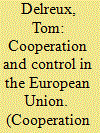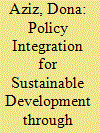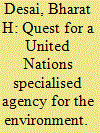|
|
|
Sort Order |
|
|
|
Items / Page
|
|
|
|
|
|
|
| Srl | Item |
| 1 |
ID:
089896


|
|
|
|
|
| Publication |
2009.
|
| Summary/Abstract |
This article examines the internal decision-making process in the European Union when the EU participates in international environmental negotiations. More particularly, the practical functioning of the relation between the member states and the EU negotiator (i.e. the Commission, the Presidency or a lead country), representing the member states externally, is examined. Starting from principal-agent theory and based on empirical research on eight EU decision-making processes with regard to international environmental negotiations, the article argues, first, that control by the member states on the EU negotiator takes place most manifestly during the course of the international negotiations, and, second, that these ad locum control mechanisms perform not only a control function, but also a cooperation function.
|
|
|
|
|
|
|
|
|
|
|
|
|
|
|
|
| 2 |
ID:
121749


|
|
|
|
|
| Publication |
2013.
|
| Summary/Abstract |
The European Union has become an important leader in international environmental affairs - particularly through the negotiation of multilateral environmental agreements (MEAs) with favourable terms. In this article, EU environmental leadership is studied from a new perspective, focusing on the ratification stage of environmental regime formation. Specifically, it investigates whether the EU is also capable of motivating third states to join its preferred MEAs. It is argued that third states join the EU's preferred MEAs to signal their compliance with EU environmental standards in an effort to become eligible for various rewards that the EU could potentially offer, including a credible membership perspective, access to its lucrative markets, and aid and assistance. The argument is tested by examining the ratification behaviour of 25 non-EU Member States with regard to all 21 MEAs negotiated under the auspices of the United Nations Economic Commission for Europe (UNECE). The results provide robust support for the theory that EU rewards motivate third states to ratify these treaties. The results withstand a number of statistical tests, even when alternative explanatory factors such as trade intensities, transnational communication and geographic proximity are controlled for. The study is the first large-scale demonstration of the EU's external influence at the ratification stage of environmental regime formation. By identifying three different channels of EU influence, the research permits a more refined understanding of the EU's role as a promoter of environmental protection standards.
|
|
|
|
|
|
|
|
|
|
|
|
|
|
|
|
| 3 |
ID:
169412


|
|
|
|
|
| Summary/Abstract |
Over the past three decades, policy integration has become a key objective for guiding and harmonizing policies for sustainable development. Most recently, the 2015 Sustainable Development Goals have added new impetus to efforts of integrating competing objectives of environmental sustainability, social development, and economic growth, as well as of integrating issue-specific environmental policies on climate change and terrestrial and marine biodiversity. While multilateral environmental agreements are important international instruments for achieving sustainable development, there has been little focus so far on their contribution to policy integration. Covering the years from 2007 to 2016, this article presents an empirical analysis of sustainability policy integration (i.e., how multilateral environmental agreements integrate environmental, social, and economic issues in their decisions) and environmental policy integration (i.e., the outreach of multilateral environmental agreements to different environmental issue areas beyond their mandate). The analysis finds that multilateral environmental agreements have not moved toward further policy integration over the studied period. If policy and institutional coherence is a key global governance target in the post-2015 era, a concerted effort will be required to improve the extent of policy integration by multilateral environmental agreements.
|
|
|
|
|
|
|
|
|
|
|
|
|
|
|
|
| 4 |
ID:
112477


|
|
|
|
|
| Publication |
2012.
|
| Summary/Abstract |
Recent years have seen intense intergovernmental deliberations on issues concerning governance in the field of environment. Their aim has been to address the role of the institutions that provide platforms for international environmental cooperation. There are two main lines of enquiry: the role of regime-specific institutions that cater to sectoral regulatory frameworks (popularly known as multilateral environmental agreements, or MEAs); and the role of institutions that are established to follow up on global environmental conferences or a specific environmental task. Most of these institutions reflect intergovernmental consensual process. However, there are concerns about their proliferation and there is a growing cacophony of calls to 'bring coherence to the fragmented landscape of MEAs, intergovernmental bodies, UN system entities and other international organizations' (Sha Zukang (2011) 'Legal and policy dimensions of sustainable development: expected contribution of Rio + 20', Environmental Policy and Law, 41(6), pp. 244-246, at p. 245). In fact the need to bring order to environmental governance has assumed great importance and urgency if environmental cooperation is to be achieved. This paper explores, in particular, the role of the United Nations Environment Programme and its potential for conversion to a specialised agency of the UN.
|
|
|
|
|
|
|
|
|
|
|
|
|
|
|
|
| 5 |
ID:
066781


|
|
|
|
|
|
|
|